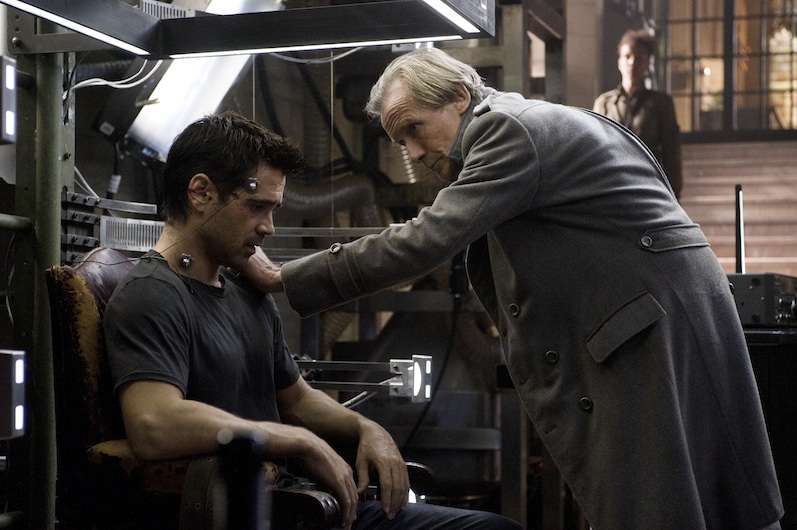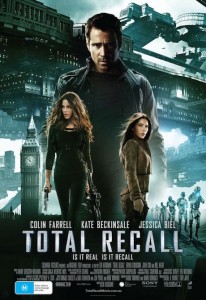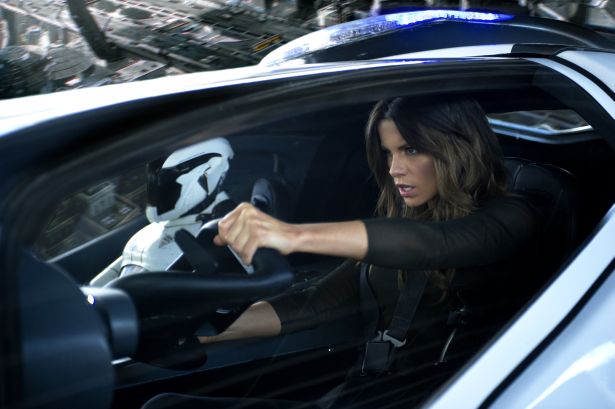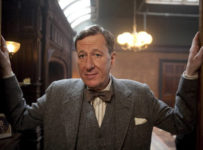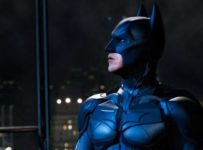Total Recall is back to mess with our memories, as history alters our vision of the future in this lightweight blockbuster.
[stextbox id=”grey” caption=”Total Recall (2012)” float=”true” align=”right” width=”200″]
Director: Len Wiseman
Writer: Kurt Wimmer, Mark Bomback
Runtime: 118 minutes
Starring: Colin Farrell, Kate Beckinsale, Jessica Biel, Bryan Cranston, John Cho, Bill Nighy
Distributor: Sony
Country: US
Rating (?): Worth A Look (★★★)
As the Total Recall reboot reminds us, all memory is subjective. It has been 22 years since Philip K. Dick’s short story We Can Remember It For You Wholesale was first adapted to the screen as Paul Verhoeven’s Total Recall (1990). In that time, our vision of the future has vastly changed, partly from the turmoil of world events but largely because we now inhabit much of that same future that was once only imagination. Len Wiseman’s recreation of that world may have gone back to the themes of the source material, but this second recollection is just as much inspired by the first film as it is by 1960s sci-fi. The result is an occasionally uneven hybrid of the two, but nevertheless entertaining.
At the end of the 21st century, a cataclysmic war has divided the world into two remaining areas: the powerful and elitist United Federation of Britain, and the Colony (a place we know lovingly as Australia). Despite his beautiful wife Lori (Kate Beckinsale), Douglas Quaid (Colin Farrell) is a factory worker who dreams of a more adventurous life, travelling each day via a gravity-elevator as it journeys through the Earth’s core from his Colony home to a menial job in the UFB. When he gets the idea of going to Rekall, a company that implants synthetic memories, everything changes. He is descended upon by a highly trained SWAT team, but is somehow able to take them out on instinct. Quaid soon finds himself on the run from the forces of the powerful Chancellor Cohaagen (Bryan Cranston), discovering his life has been a lie. Aided only by Melina (Jessica Biel), a woman literally from his wildest dreams, Quaid must race against the clock to find the mysterious resistance leader Matthias (Bill Nighy).
Wiseman’s Total Recall owes a lot to its forebears, not just in its narrative but in the aesthetics of the future world as well. The Colony home is appropriately like Ridley Scott’s vision of Blade Runner (1982), also inspired by a Philip K. Dick novel, a beautiful mish-mash of Asian future noir that is perpetually soaked in rain. Eschewing the Mars plot of the earlier versions, the UFB is something new to this world, but it too has the same clean look of recent sci-fi adaptations I, Robot (2004) and to a lesser extent, George Lucas’s Star Wars prequels. Future London is a curious blend of old architecture and future modern, making for a mostly pleasing set of visuals. This is the first major departure of the film, with Wiseman not building a better future world but recreating one, remembering the future for us wholesale, as it were. With the grunginess and exotic nature of Mars gone, so too is much of the intrigue and paranoia that ran through the first version of the film.
Yet romanticising the original would also be folly, and to remember Verhoeven’s take as a high-end example of the genre would be tampering with falsely implanted memories. Wiseman acknowledges that film, tipping his hat to fan-favourite moments and even whole scenes from the 1990 film. Verhoeven’s ’90s style is just as outdated today as some of Dick’s notions, but what it retains in that film is a sense of mystery that the Total Recall reboot has little need of. Once the identity dilemma is established, the mystery is abandoned in favour of a series of increasingly ambitious set-pieces, with Quaid and Melina running, gunning and fighting their way across the UFB. These are all meticulously staged, and while we have seen it all before, the elevator chase sequence is a knuckle-whitener. This Total Recall is an action film first, and its speculative fiction is merely the set-up.
Total Recall is still an incredibly fun if unnecessary outing, with enough adrenaline to carry it through to its spectacularly staged conclusion. Farrell makes for a far more convincing lead than Schwarzenegger ever did, bringing a more human quality to the character, albeit toning down the puns in favour of furrowed brows. There’s little doubt that Bryan Cranston was going to bring some great villainy to the role, but he is unfortunately sidelined somewhat by the expansion of wife Beckinsale’s role, proving that nepotism is still alive and well in Hollywood. This latest version may not be as memorable as the earlier blockbuster, but it would be a shame to dismiss this for what it isn’t.
Total Recall is released in Australia on 23 August 2012 from Sony.

